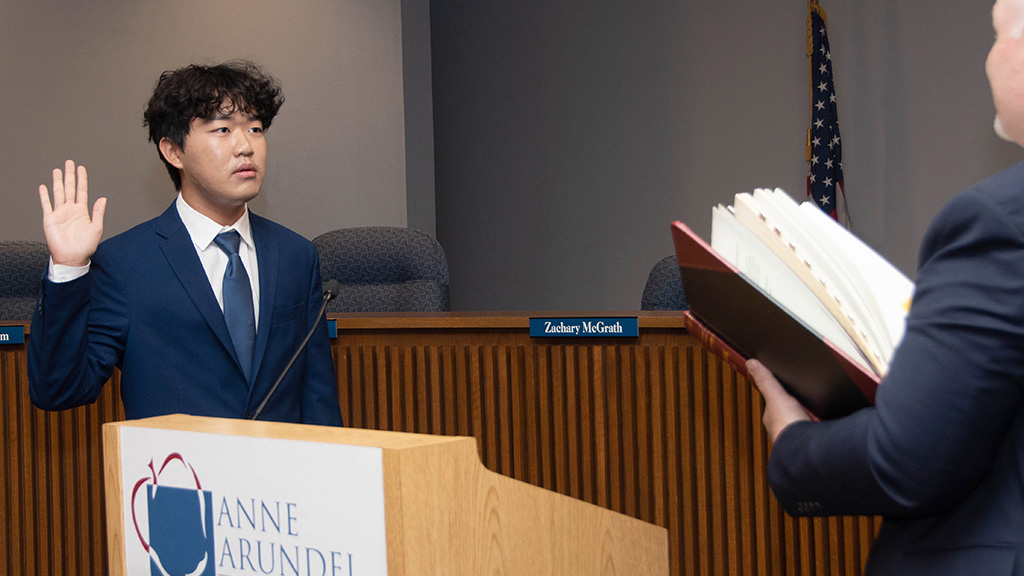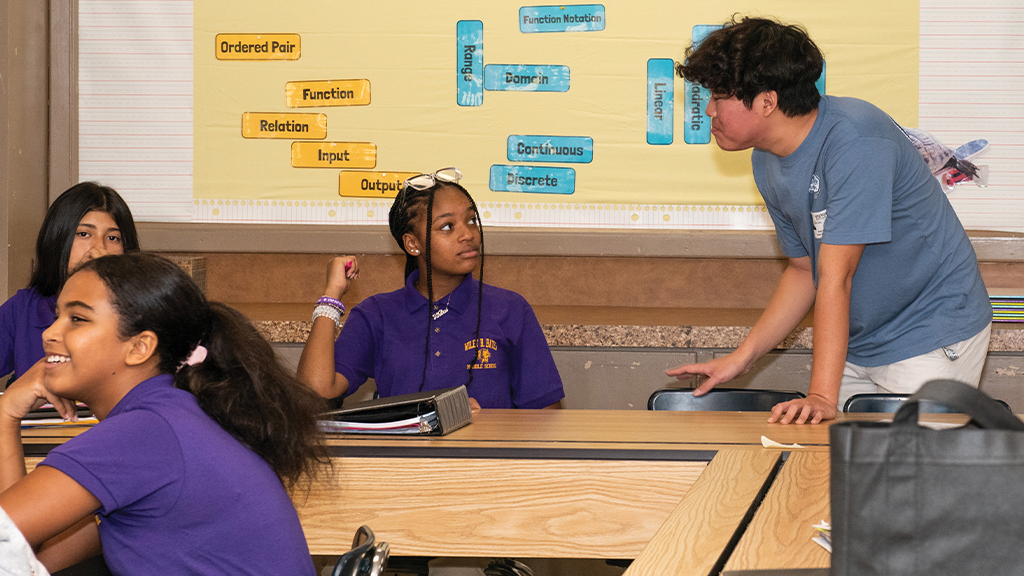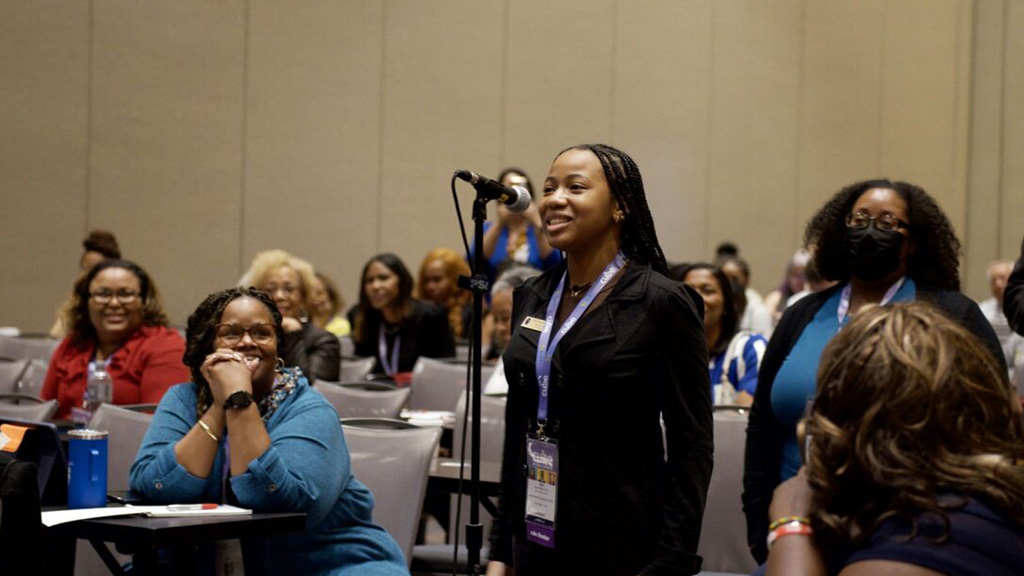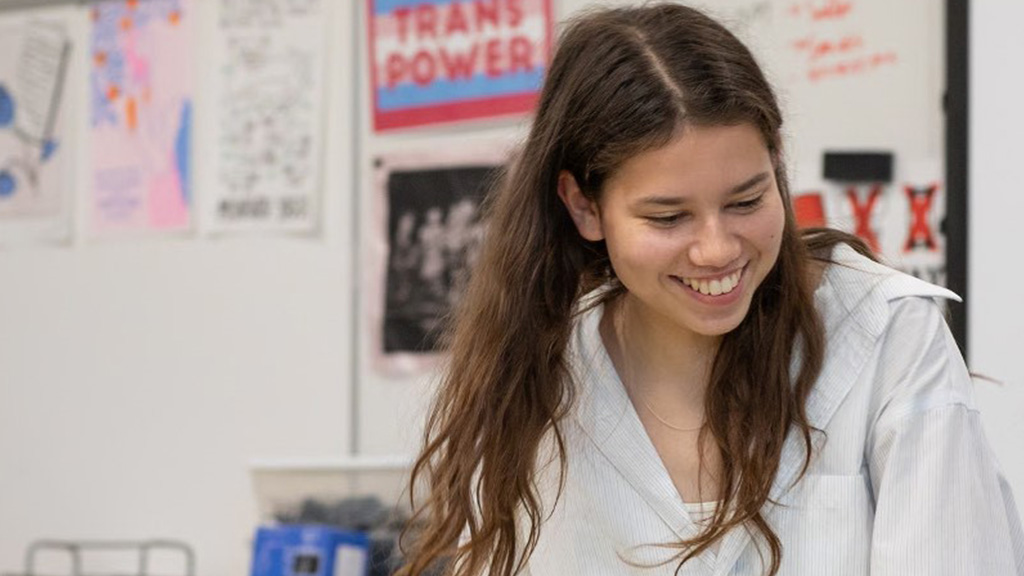
ERIC LIN, STUDENT MEMBER OF THE BOARD OF EDUCATION FOR MARYLAND'S ANNE ARUNDEL COUNTY PUBLIC SCHOOLS, TAKES THE OATH OF OFFICE.
PHOTO COURTESY OF AACPS
Eric Lin is a rarity in the world of local school boards. The Maryland high school senior is a full voting member of the Anne Arundel County Public Schools (AACPS) School Board. Lin’s vote on everything from personnel matters to the use of ESSER dollars, from collective bargaining agreements to capital and operating budgets, is equal to every other member—every adult member—on his school board.
Not only is the recently turned 18-year-old’s voting privilege rare—he’s believed to be the only student member of a local school board in the nation able to exercise such extensive voting rights—he’s also the 49th AACPS student board member granted complete voting rights and the 50th district student to sit on the board for a one-year term.
Lin acknowledges that a certain amount of pressure comes with the job, both in adequately representing the voice and concerns of the district’s 85,000 students and in ensuring that he understands the array of essential, sometimes controversial, issues that come before the board.
In July, just two weeks after being sworn in, he voted on a hotly debated policy proposal to limit the types of flags that could be displayed on school property. His decision to oppose the proposal came after reading 2,000 public comments, responding to dozens of direct emails, reaching out to constituents on social media, and hosting an informational session.
“You obviously want to make sure that you’re knowledgeable on the things you’re voting on and are fully informed,” Lin says.
While it is unusual to have a student member of the board (often referred to as a SMOB) with voting rights equal to that of the adult board members, it’s been a tremendous asset to the school district located just south of Baltimore, says board President Joanna Bache Tobin. “Clearly, the selection process we have works because we just get terrific members coming on all the time. They do amazing work.
“I know there are districts that look at us and say, ‘How could you possibly do that?’” Tobin says. “I just say, ‘You don’t understand the value of it until you really see it in operation.’”
A Niche Thing
Students increasingly are asking for authentic ways to be engaged in the decisions that shape their experiences at school. They are speaking out on issues that include gun violence, climate change, banned books, and the teaching of African American studies. Students serving on school boards, while not a new practice, represents a way for student voice to be heard and for school leaders to better understand and support their students.
Student involvement on boards varies by state and by district. Several recent developments include:
All school boards in New Hampshire must include at least one student member of each public high school to serve as a nonvoting school board member, as of January 2023. Previously, Massachusetts and Ohio were the only states that required boards to include students as members, according to a 2021 report by NSBA. The report also found that at least 31 states allow local boards to have student members who are either selected by adult trustees or elected by their peers.
California Gov. Gavin Newsom in October signed into law a bill that gives school district and county boards of education the option to compensate student board members for their work. This “will reflect their time and work dedicated to solving issues that impact students and representing the student voice in discussions,” wrote California Assemblymember Chris Ward, who introduced the bill. It’s also aimed at leveling the playing field so that students who might not consider board participation because of financial limitations could do so.
An independent student organization, the National Student Board Member Association (NSBMA), launched in June to offer training and professional development to students serving on school boards and to advance student representation on school boards nationwide. “The addition of student board members on school boards is relatively still a niche thing,” says Jennifer Tran, a college student and member of NSBMA’s board of advisors.
“That was a point of equity that we really wanted to emphasize,” says Tran, who helped draft the bill when she served as the 2021-22 student member on California’s Garden Grove Unified School District School Board.
About 1,000 students serve on district, charter, and state-level boards, according to data collected by NSBMA. Just 0.7% of student board members have full voting privileges (that includes AACPS’s Lin and student members on several state boards of education), 1.1% have partial or limited voting rights, 24.7% have preferential or advisory voting rights in which their votes are recorded but not counted in official tallies, and 73.5% have no voting rights.

STUDENT MEMBER OF THE BOARD LIN TALKS TO A FELLOW DISTRICT STUDENT.
PHOTO COURTESY OF AACPS
Problem solvers and solution seekers
Observers of student participation on school boards say the value that student members bring—their voice and insight—represents a much-needed way to improve education and grow civic engagement.
Student-centered decision-making means including student voice, says NSBA Executive Director and CEO Verjeana McCotter-Jacobs. “It is important that school boards appreciate the value of including students on their local boards to provide an insight that we sometimes miss.”
Vicki Phillips is a longtime advocate for supporting student voice and agency. A former chief state school officer in Pennsylvania, superintendent of schools in Portland, Oregon, and head of K-12 education at the Bill & Melinda Gates Foundation, she is currently chief executive officer of the National Center on Education and the Economy. The Washington-based think tank is incubating and lending support to the new national student association.
Phillips says that she has been impressed with the group leaders’ deep concern for education. “Having come out of COVID, they were kind of on the front lines. They understand what they’re looking for going forward and have a lot of great ideas.” As problem solvers and solution seekers, “They’re not about throwing blame at the system,” Phillips adds. “They’re about really helping find the right solutions. And they’re very much fans of intergenerational collaboration. They’re totally open to working with adults, each of us guiding each other along.”
Student participation on school boards is an essential act of civic engagement that can offer the larger school community the opportunity to see a transparent, accountable form of government—the school board—at work, says Kei Kawashima-Ginsberg, director of the Tufts University-based, nonpartisan Center for Information and Researchon Civic Learning and Engagement (CIRCLE).
“At a time when young people really are not seeing great examples of governing at the federal level, even sometimes state level,” she says, “it’s important for them to see that the government is for them. They can feel it and touch it. They can trust it, even if it doesn’t do all the things they want.”
Training, support, and collaboration
Tran, who served as a preferential voting student board member, was the first student on the board for her Southern California district. Zachary Patterson was the first for California’s second-largest school district, San Diego Unified School District, from 2019 to 2022. Together, they helped launch the California Student Board Member Association. The informal group focused on training and support so that they and other student board members across the state could learn how to better operate in their new roles.
With most student board members serving one or two terms, there’s not a lot of time to learn how to be a board member, Patterson says. Through online chat sessions, their group addressed such board essentials as meeting procedures, filing a motion, how district budgets work, and federal funding streams.
After connecting with student board members outside of the state, it became clear that there was a need for this same training and collaboration nationwide, and NSBMA was born. In August, it hosted a virtual three-day training conference: The Student Trustee Action Readiness Training, or START. About 30 students participated, and the group projects membership will quickly reach 100 student board members.
“Student board members are this unique opportunity for student voice not just to be conveyed and listened to but to genuinely drive change within school districts,” says Sean Simonini, who served as the 2021-22 student member on Massachusetts’ Billerica Public School Committee and helped launch NSBMA.
Change, however, can only be done in collaboration with adult school board members, he adds, stressing NSBMA’s commitment to building intergenerational partnerships. “This is a core tenet of the work that we do. As we like to say, we’re youth-led but intergenerationally driven.”
State school boards associations often offer training opportunities to student board members. Every year, staff with the Maryland Association of Boards of Education (MABE) provide training for new student members while also introducing them to their peers and giving them an idea of the ins and outs of their upcoming school board service, says Executive Director Milt Nagel.
The Minnesota School Boards Association similarly offers a full-day training for student board member representatives, says Executive Director Kirk Schneidawind. It also has published guidance for association members on helping student board representatives “have a positive experience, whether it’s through onboarding, orientation, mentorship, all of those important elements,” he says. “But I would say that the ownership of this really comes through our locally elected boards and their superintendents.”
PRINCE GEORGE'S COUNTY PUBLIC SCHOOLS STUDENT MEMBER OF THE BOARD RAYNE RIVERA-FORBES MAKES A COMMENT DURING A SESSION FOR FIRST-TIME ATTENDEES AT NSBA'S 2023 CUBE CONFERENCE.
PHOTO COURTESY OF NSBA
Pandemic recovery; teacher strikes
Maryland has a long history of student representation on state and local school boards, with 22 of the state’s 24 school districts having student board members or student commissioners, says Nagel. The state legislature has approved voting powers for student board members in eight of the 24 districts—seven have limited voting rights and one has full voting rights.
Rayne Rivera-Forbes, a high school senior in Maryland’s Prince George’s County Public Schools, is the district’s 43rd student member to serve on the school board, elected by the Prince George’s Regional Association of Student Governments. She is the first, however, with a nearly full slate of voting rights. Although she cannot vote on collective bargaining and personnel matters, her recently expanded voting rights in the 131,000-student district now include school closings, reopening and boundaries, student disciplinary matters, and capital and operating budgets. She recently voted to approve the second phase of the district’s public-private school construction partnership.
Rivera-Forbes says her primary goal as the student voice on the board is to “really bring transparency and help rejuvenate” her school system. “The pandemic put so many of our students in a tough position emotionally, mentally, physically, academically. A lot happened,” she says, recalling her first year of high school conducted online. “What I want to do is not only continue to push for support for our students but to bring back some of the passion we had before for student advocacy.”
Rivera-Forbes was among the 1,000 attendees at NSBA’s Council of Urban Boards of Education conference in September. She attended the Chicago event with several board colleagues as part of their required professional development. “I was not expecting the amount of approval that I got (from other attendees) and also the amount of curiosity and people saying they wanted to implement a student board member themselves,” Rivera-Forbes says.
Francesca Silverstein, a high school junior in Oregon’s Portland Public Schools, is the advisory-voting student representative on the district’s school board, elected by the members of the District Student Council (DSC). She does not vote on personnel decisions or attend executive sessions, and her unofficial votes do not count toward final board decisions. She does “participate as appropriate in deliberations” and attends every regular board meeting, assigned work session, and policy committee meeting. “If it’s open to the public, then I participate,” says Silverstein, noting that DSC members have been assigned to various board committees. She’s developed a particular fondness for the policy committee because “policy really directs how the district is going to be run.”
Leading up to and during the teachers’ strike that closed the 44,000-student district for most of November, Silverstein and the DSC held speaker sessions with district administrators, union representatives, and other stakeholders to learn about the demands and negotiation status and to “gather our thoughts and what we heard from students at our schools.” She incorporated that information into the student rep report she regularly delivers at board meetings.
With the recent news that district Superintendent Guadalupe Guerrero will be resigning in February, Silverstein says that she “will be pushing to have students included in the hiring process.”
HIGH SCHOOL JUNIOR FRANCESCA SILVERSTEIN IS THE STUDENT REPRESENTATIVE TO THE PORTLAND PUBLIC SCHOOLS BOARD OF EDUCATION.
PHOTO COURTESY OF PPS
A seat at the table well used
In Anne Arundel County, generating student engagement and involvement with the board of education has been a top priority for Lin. “Looking at other counties, you’d see students going to board meetings, testifying, sharing concerns, and demanding action. But I never saw students at our board meeting.” To address the disengagement and ensure that students know they have an outlet to express their concerns, he created the SMOB Advisory Council, modeling it after initiatives in neighboring jurisdictions. In addition to discussing issues that members want to address, such as school safety, school meals, and academic workload, there’s been instruction on making public testimony before the board. “I coach them through how to testify, how to sign up, how to write an effective testimony.” Several students have recently taken the next step and appeared before the board.
Along with regular visits to district schools to meet with students and staff, Lin also hosts the SMOB Minute , a monthly video posted on the district’s social media pages that updates students on board-related business.
“As a SMOB with voting rights, I want to be out there and get students to know that the position exists, how unique it is, and get more students as possible civically involved.”
As a student representative in Massachusetts, Simonini says he would have loved it if the Billerica Public School Committee had given him full voting rights. However, that was impossible, given that state law explicitly prohibits student board members from holding a vote. In 2023, members of the Massachusetts Association of Student Representatives drafted a bill and filed it in the state legislature to empower student representatives as voting members on every school committee in the Commonwealth.
“There hasn’t been much of an appetite” for enacting that change, says Glenn Koocher, executive director of the Massachusetts Association of School Committees. “The rationale is if every school committee member has to run districtwide, why should a high school student, who only has to campaign in front of the student council, get as much of a vote as someone legally elected?”
Lack of voting rights doesn’t diminish the impact and value of nonvoting student representatives, Koocher says. “In fact, we have argued that a seat at the table well used is more effective than a vote on the roll call because student representatives have credibility for the arguments they make about student concerns.”
Based on her experience in AACPS, board Chair Tobin views the discussion over student voting rights with a different lens. When a student board member is only a part of limited discussions and shut out of meetings, they miss out on the critical conversations and relationship building that develops between board members, she says.
This is “where we really come to understand what each member is concerned about, what their perspective is, etc.,” Tobin adds. The relationship “is truncated, in a sense. The access to student voice also becomes less organic, for lack of a better word. It is as if we decide to insert student voice where and when we—as the adults—want it and insist it not be heard where we don’t want it.”
Michelle Healy (mhealy@nsba.org) is senior editor of American School Board Journal.



Share this content